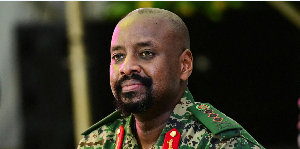A forty-five year old ex-soldier, Sgt (rtd) Karim Salifu Adam, who refused to implicate President John Kufuor, Courage Quashigah, Prof Adu Boahen and Dr Safo Adu in a trumped up treason charge in 1994 has made a stunning revelation that the Bureau of National Investigations (BNI) offered him a bribe to implicate them.
According to him, the BNI kept a cache of arms and ammunition at an unknown place and presented him an amount of $10 million, which was in hundred denominations and asked him to say on camera that the ammunition was given to him by the four men who were then leading opposition members of the New Patriotic Party (NPP).
“They told me not to panic because they were not going to hurt me and that they had kept a cache of arms and ammunition somewhere which they would show me if I agreed to cooperate with them. They said I should say that the arms were given to me by Prof Adu Boahen, John Agyekum Kufuor and Dr Safo Adu.
They presented me with an amount of money, which they said was $10 million in hundred denominations. I refused and told them that it was too much for me to do that because the people hadn’t done anything. They promised me that they won’t harm them but they only wanted the world to know that they are people of tolerance and integrity,” he said.
Ex-Sgt Karim said while the discussion was going on at the Accra office of the BNI, one of the agents entered the room and said, “the camera is ready.”
The visibly angry ex-soldier told Chronicle investigators that soon after he refused to heed to their request he was blindfolded, handcuffed and taken to an unknown destination where he was dumped in a condemned cell. The cell room, he said, was flooded above ankle level.
The aggrieved soldier recollected that before his refusal to implicate these “innocent men,” he was kept in a “self-contained” cell at the BNI headquarters where he had access to television, radio, a bed, a dining table and a fridge stocked with assorted drinks.”
He added that he ate good food, which made him wonder why such special courtesies were being extended to him in a BNI cell. “It was only after I refused to do what they wanted me to do that I was removed from the comfort of the self-contain room and dumped in that condemned cell,” he said.
It all began four years after Sgt. Karim resigned from the Ghana Armed Forces on July 1, 1996 to concentrate on his construction firm in Tamale, in the north. He was in the Armed Forces for 15 years. That is from 1976 to 1991.
On May 23, 1994, ex-Sgt. Karim was dropping his children at school when BNI agents arrested him before his children on suspicion of arms dealing. “They alleged that I was dealing in arms and ammunition so they went to my house and searched me and nothing was found. The next day, which was May 24, I was brought to the BNI headquarters where they kept on saying that I should cooperate with them and that they won’t do anything to anybody,” he said.
He said on his arrival he met four officials at the BNI headquarters whom he named as “Lt. Col. Okran, Chief Inspector Agbenyegah, Col. Ahiadzi and Balanson Quansah. Sgt Karim said he was kept at a “self-contain” cell between May 24 and June 6, 1994 when they had hints that the private press had got wind of his detention and torture.
He said after he had refused to implicate the four opposition members, “they tortured me and at a point I was bleeding all over my body and there was plenty blood in my stool. This torture continued until June 14,1994.
Sgt. Karim recollects that by that time news about his detention had gone round and the Ghanaian Chronicle has published an article about his detention, forcing the BNI to quickly send him to court on June 15, 1994.
“Immediately after the story was published, I was rushed to court the next morning, before a Magistrate Judged called K.O. Kumi on 15 June, 1994 on provisional charge of treason.”
According to Sgt Karim he was prosecuted by Mr Osafo Sampong, currently, the Director of Public Prosecutions. He said Mr Sampong prayed the court to remand him for further investigations. “Anytime we appeared in court, they managed to buy more time for me to be remanded.”
He continued that his counsel, Mr Akoto Ampaw, consistently pressed for the case to be heard until he was finally indicted for treason on November 23, 1994. He said he never appeared in court again until May 14, 1996 when trial began. It ended on November 28, 1996.
Continuing, Karim said the presiding judge, Justice K.K. Kurankye kept on postponing the judgement date until he fell sick and died in April 1997. “He first gave January 31, 1997 as judgement day. He adjourned it to February 21, 1997 and again adjourned it to March 21 and April 11 and May 9, 1997. The time buying continued until he himself passed away.
Soon after the death of the presiding Judge, Karim was dumped in Prison Custody at Nsawam Prisons and taken to court again on July 7, 1997 for a re-trial, a move he and his counsel rejected and saw as part of the time buying trick by the prosecutors.
Karim told Chronicle in an interview over the weekend that while affable counsel, Mr Akotoko Ampaw disagreed with the re-trial of his client and insisted on judgement, the new presiding Judge, Justice Faakye, also insisted on a re-trial compelling his lawyers to send the case to the Supreme Court.
“I never appeared in court again until I was finally told that my docket was missing. My docket could not be found until the new government came into power in 2000 when I was freed,” he said.
On July 30, last year, ex-Sgt Karim, the Tamale based contractor, was set free by an Accra High Court presided by Justice Apaloo. His release followed an application of the government’s disinterest in continuing with his prosecution by the new Attorney General. According to records, Karim’s trial was riddled with many controversies some of which cast a dark spot on his trial.
There were contradictory evidence by prosecution witness and the chief investigator of the case, Inspector Frank Agbenyegah of the BNI. It emerged that even though Inspector Agbenyegah did not contact the Ghana Embassy in Burkina Faso, evidence was given in court, which suggested that the Ambassador had been contacted after learning that Karim was recruiting and giving military training to about 21 people in Burkina Faso to overthrow the then government of Ghana.
Also, Agbenyegah made the court to believe that he had confirmed with the Northern Regional branch of the BNI that Karim was a contractor even though he could not produce documents in respect of an official request for that information or confirmation.
“After I was free, I realized that my job was gone, all my machines have broken down, my children’s education are in jeopardy and I have come to meet a broken home. All my children have dropped out of the school. My mother died while I was in jail. I am now a beggar. Mr first born, Yussif Abdul Karim is 22 years and unemployed. I am not doing anything and my world has now been shattered for a crime I did not commit,” Karim told Chronicle investigators.
When Chronicle asked Karim how he felt having been imprisoned for nearly seven years for a crime he thinks he is innocent of, he said, “I feel very bad and bitter to have been treated like this. If I had several options, I will choose vengeance first because I think the people who have jeopardized my life for no crime must be paid back in their own coin. If this is the way I am going to be treated then I can seek vengeance no matter how much it will cost me.”
“Look, now I am out of jail, nobody seems to care about my plight. If this is the way I am going to be treated then like I said, I will not care how much it will cost me to seek vengeance. People who can help me get out of this mess don’t seem to care,” he said.
When asked by Chronicle investigators whether he was prepared to cooperate with the Truth and Reconciliation Commission he said, “yes, why not.”
General News of Monday, 11 February 2002
Source: Ghanaian Chronicle












